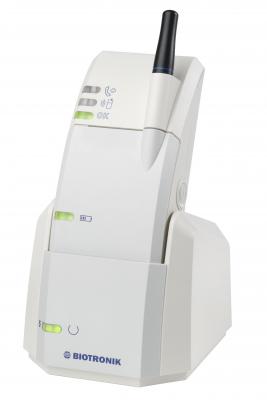
January 4, 2013 — Biotronik announced that the European Heart Journal has published the clinical results of the ECOST trial (Effectiveness and Cost of ICD Follow-Up Schedule with Telecardiology). The randomized controlled study evaluated the safety and efficacy of Biotronik Home Monitoring compared with standard in-office follow-up visits for patients with implantable cardioverter-defibrillators (ICDs).
Results from ECOST provide pioneering scientific evidence that continuous remote monitoring with Biotronik Home Monitoring reduces inappropriate shocks, may improve battery longevity in long-term follow-up of patients implanted with an ICD and is as safe as, sometimes even safer than standard in-office follow-ups. This outcome is consistent with previous findings from studies such as the landmark TRUST trial.[1,2]
ECOST is a prospective multicenter clinical trial designed to examine the safety and efficacy of remote monitoring of ICD patients with Biotronik Home Monitoring over 27 months. The study analyzed 433 patients from 43 sites throughout France who were randomly assigned to home monitoring follow-up or standard in-office care. The 221 home monitoring patients (the active group) were seen in the ambulatory department once per year, unless home monitoring reported a technical or clinical event requiring an in-office visit. The 212 control group patients underwent in-office visits every six months.
During a two-year period, the overall number of delivered shocks in the home monitoring group were 71 percent lower than in the control group — a significant decrease. Furthermore, the proportion of patients who received inappropriate shocks was 52 percent lower in the home monitoring group than in the control group. While some remote monitoring technologies can drain the device battery in the long term, daily BIOTRONIK Home Monitoring retains ICD battery life: ECOST showed a 76 percent reduction in the number of capacitor charges for the Biotronik Home Monitoring group (499 vs. 2081), resulting in extended device longevity.
“The ECOST trial results prove Biotronik Home Monitoring reduces inappropriate shocks in patients and also positively extends the ICD’s battery longevity,” said Professor Salem Kacet, principal investigator of the ECOST study. “This advanced technology is very important for the observation of arrhythmias and early adaptation of ICD therapy. Patients benefit from the reduced risk of inappropriate shocks — which can be a very unpleasant experience — and need ICD replacement less frequently.”
For more information: www.biotronik.com
References
1 Varma et al., Circulation, 2010, 122, 325–332.
2 Varma et al., Circ Arrhythm Electrophysiol, 2010, 3:428–436.


 January 05, 2026
January 05, 2026 









